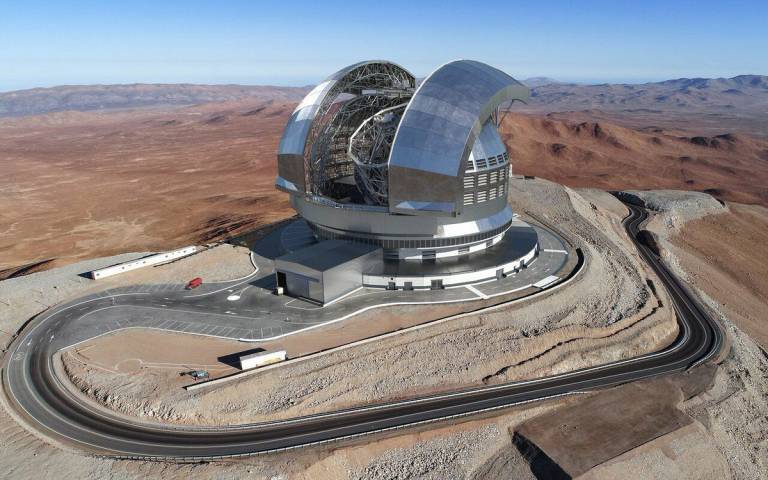New report sets course for future of European astronomy
9 May 2023
A new report by an international consortium of leading astronomers, including UCL’s Professor Amelie Saintonge, has set out recommendations to transform our understanding of the universe in the next decade.

The ASTRONET Science Vision and Infrastructure Roadmap 2022 to 2035 is the latest comprehensive roadmap produced by the ASTRONET network of European funding agencies and research organisations. The network includes the UK Science and Technology Facilities Council (STFC).
ASTRONET is an independent consortium whose aim is to create a common science vision for all European astronomy by convening diverse groups to ask some of the biggest questions in science.
Professor Amelie Saintonge (UCL Physics & Astronomy), lead editor of the report, said: “The technology behind the facilities that allow for ground-breaking astronomical discoveries often takes decades to mature. This is why it is essential to take a long term and global look at our scientific priorities, as we do in the ASTRONET Science and Infrastructure Roadmap.
“The Roadmap highlights the need for a balanced and integrated infrastructure where large flagship observatories are complemented by smaller rapid-response facilities, computation and data centres, as well as laboratory facilities and technology development infrastructures.
“Another growing priority of the community is that astronomical research is conducted in a sustainable and equitable manner, that also fulfils our roles as educators and responsible citizens. The report highlights the importance of including these considerations right at the first moments of decision making.”
Panels including over 100 scientists from across Europe fed into the report and a series of public consultations were also held to ensure that it reflected the breadth of views within astronomy.
These established key priorities, such as understanding the origin of the Universe and the evolution of planets in our solar system, as well as making recommendations on the facilities and resources needed to meet these priorities.
In making its recommendations, the report considers recently published visions provided by the European Space Agency, NASA, and advisory bodies such as the particle astrophysics consortium.
The aim of the report is to create an openly accessible resource for policymakers and science leaders to support informed decisions that more effectively and efficiently direct scientific discovery.
The previous ASTRONET Science Vision and Infrastructure Roadmap (published in 2007 and revised in 2015) included recommendations which fed into proposals for projects such as:
- The European Southern Observatory (ESO) Extremely Large Telescope in Chile
- The Square Kilometre Array Observatory, which is headquartered at Jodrell Bank near Manchester
These and other recommended initiatives have gone on to receive significant UK support and involvement.
Through recommendations such as these, the ASTRONET Roadmap has become a valuable source of information for the benefit of the entire research community.
The recommendations of the latest report include:
- Timely construction of the Cherenkov Telescope Array to detect very high energy gamma rays from black holes and other extreme phenomena
- Adoption of the European Space Agency Athena and Laser Interferometer Space Antenna missions to study black holes, detect and accurately measure gravitational waves from astronomical sources and more
- Development of second-generation instruments to enhance the capability of the ESO Extremely Large Telescope
- Introduction of more robust environmental footprint assessments for astronomical research and greater consideration of how to reduce the environmental impact of space science
- Investing in people to guarantee our ability to foster scientific and technological advances in astronomy
Researchers at UCL Physics & Astronomy as well as the Mullard Space Science Laboratory at UCL have key roles in many of the initiatives and facilities discussed in the roadmap.
Dr Colin Vincent, STFC Associate Director of Astronomy and Chair of the ASTRONET board, said: “Astronomy is a necessarily international field and so, while it is important that individual nations set their own priorities, a common view is essential to enable world class programmes and capabilities, with European leadership.
“We are living through an incredibly exciting time for science with game-changing space missions like the James Webb Space Telescope redefining our understanding of our place in the Universe.
“It is imperative that we build on this momentum by taking a strategic view of how we can combine efforts across Europe and globally to continue to push the limits of our knowledge.”
Links
- ASTRONET roadmap, 2022-2035
- Professor Amelie Saintonge’s academic profile
- UCL Physics & Astronomy
- UCL Mathematical & Physical Sciences
Source
Image
- An artist’s impression of the Extremely Large Telescope - one of the projects supported in ASTRONET’s 2008 astronomy roadmap. It is currently under construction. Credit: ESO
Media contact
Mark Greaves
T: +44 (0)7990 675947
E: m.greaves [at] ucl.ac.uk
 Close
Close

